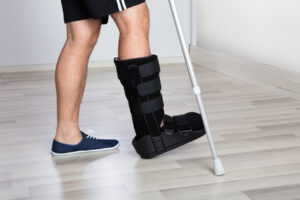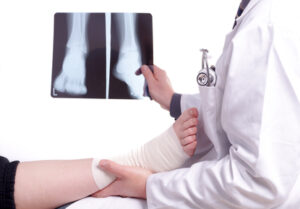Many people get frustrated with foot and ankle injuries. I suffered many ankle injuries while playing basketball. These injuries made it difficult for me to stand and walk while I recovered.
Many jobs require standing and walking or other activities that are difficult or impossible to do after a foot or ankle injury. When an injury at work keeps you out of work or limits what you can earn, you may be entitled to workers compensation wage loss benefits.
These benefits are one of the three primary benefits provided by Georgia’s workers compensation law.
What sort of work activities are affected by foot and ankle injuries?

Walking and standing
While some jobs allow you to sit or stand, many jobs require you to spend a lot of time on your feet. Most people with foot and ankle injuries have difficulty standing or walking for an extended period of time.
Climbing
Some jobs require you to climb stairs or ladders frequently. A foot and ankle injury makes it difficult and potentially unsafe to go up and down stairs or ladders.
Balancing
If your job requires you to work at heights, you need to be sure that you can keep your balance to avoid falling. A foot or ankle injury often makes it dangerous to work at heights.
Lifting
Proper lifting technique usually requires you to use your legs. Heavy lifting could be difficult with a foot or ankle injury. If a job requires you to carry a heavy item, it could cause additional problems since carrying really combines walking and lifting. Also, improper lifting and carrying might cause you additional injury.
What happens if I cannot do my job because of restrictions from my injury?
After a workers compensation injury, you should receive medical evaluation and treatment. You may want to see a foot and ankle specialist. Georgia’s workers compensation law has rules about what doctors you can treat with for your injury, and you will want to get a copy of your employer’s panel of physicians.
The workers compensation doctor will probably place you on some restrictions. There is a good chance that the doctor may restrict you from performing standing, walking, climbing, balancing, or lifting.
If your doctor says you cannot do these activities and your regular job requires you to do them, then you will probably not be able to return to your regular job. In that case, one of two things will likely happen:
- Your employer will offer you a light duty job, or
- Your employer will send you home because they do not have suitable light duty work.
If your employer offers you a light duty job, you will want to make sure that it is suitable to your restrictions. If not, then you will probably need to address this.
You will also want to know whether the light duty job will pay you as much as you made before. If it does not, you will probably be entitled to temporary partial disability benefits.
If your employer sends you home because they do not have suitable light duty work, then you should start receiving temporary total disability benefits. This article talks more about temporary total disability benefits including how long the insurance company has to start paying them.
Do I have to go back to work after a foot or ankle injury?
No. You do not have to go back to work. But, refusing to go back to a suitable job can affect your entitlement to workers compensation benefits.
The primary situation where you would need to return to work is when your employer offers you a suitable job. Georgia’s workers compensation law has special rules about light duty job offers. These rules usually provide you with a trial return to work period. They also address whether you will continue to receive workers compensation benefits depending on how your return to work goes.
The light duty job rules can be some of the most confusing rules in Georgia’s workers compensation law. I see many situations where people’s workers compensation benefits get stopped because they refuse to return to work or because of what happens after they try to return to work. I always recommend that someone have a consultation with a workers compensation attorney when they face a light duty job offer.
Can I fight about the light duty job offer if the job is not suitable?
Yes. Georgia’s workers compensation law provides opportunities to contest the suitability of a light duty job provided by your employer. Workers compensation judges generally have the final say on whether a light duty job is suitable.
But, the important thing to understand is that the special light duty rules I mentioned above will determine what happens while you are waiting to go to court and get a decision from a workers compensation judge. If you do not fully understand these rules, you could have to wait many months without receiving workers compensation checks while you wait on a decision from a judge.
Can I go back to work with a different company after my injury?
Yes. You can go back to work with a different company. But, you should be aware of how it could affect your case.
One thing that will happen if you go back to work is that your workers compensation wage loss benefits will stop or get reduced. Your earnings at the new company will be counted against your wage loss.
Also, the special light duty job rules I mentioned above will probably not apply to you attempting a light duty job with a different company. This means that it will be much more difficult to try to get your workers compensation checks restarted if you cannot continue doing the light duty job.

There is one special situation where you can continue working at a job without having it count against you which is known as concurrent dissimilar employment. The idea behind this situation is that your concurrent dissimilar employment earnings are not counted for you in what workers compensation pays you so they should not be counted against you when you are able to continue that job.
But, concurrent dissimilar employment is a very confusing area of the law because your earnings do count against you if you return to concurrent similar employment. The best thing to do in this situation is to consult with an attorney and get answers before you return to work to make sure and avoid the problems that returning to work can cause.
What happens if I have permanent restrictions that prevent me from going back to work?
Unfortunately, serious foot and ankle injuries often cause permanent limitations. You might not be able to do a job that requires you to be on your feet much. You could need to avoid climbing or working at heights.
If your workers compensation injury causes permanent restrictions that prevent you from going back to work, then the insurance company should keep paying you temporary total disability benefits. But, Georgia law limits how long you can receive these benefits. Also, the insurance company can often reduce the amount of your benefit check over time.
In most cases, the longest that you can receive temporary total disability benefits is 400 weeks from when your injury occurs. In other words, your temporary total disability benefits will stop at 400 weeks from your injury even if your injury still keeps you from working. The one major exception to this is a catastrophic designation.
In many cases, the insurance company can reduce the amount of your check sooner if you are drawing more than the maximum temporary partial disability benefit by filing a Form WC-104. This form may allow the insurance company to reduce your check amount. Also, it allows them to reduce the time limit for how long you can receive checks to 350 weeks from your date of injury.









